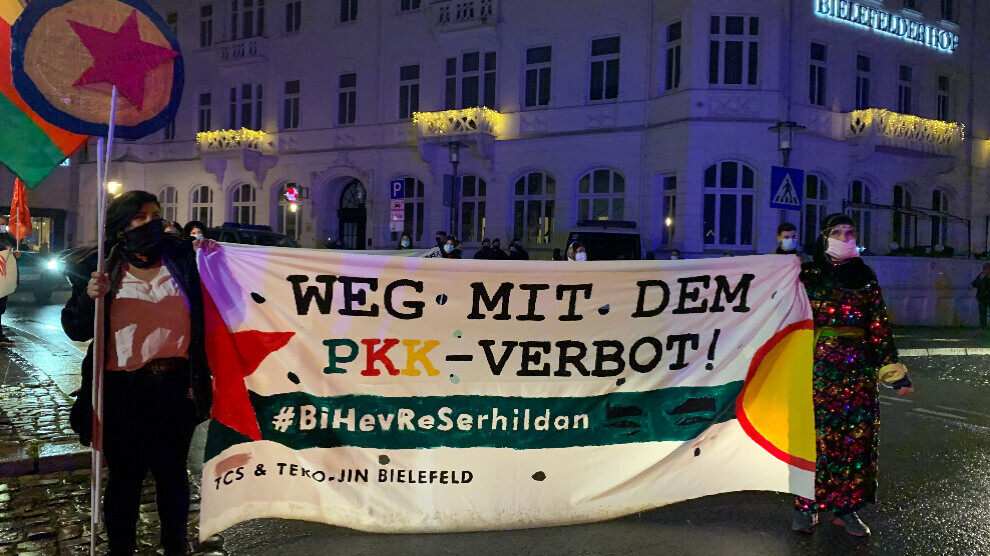Campaign to remove the PKK from the EU's list of terrorist organisations kicks off
Endorsed by 23 international figures, a campaign to remove the PKK from the EU's list of terrorist organizations has been launched.
Endorsed by 23 international figures, a campaign to remove the PKK from the EU's list of terrorist organizations has been launched.

An urgent call for the removal of the PKK from the EU's list of terrorist organizations has been issued by 23 international figures. Among the first signatories are Elfriede Jelinek, writer/Nobel Prize in Literature, Austria; Slavoj Žižek, philosopher, Slovenia and Srećko Horvat, philosopher/Croatia.
The call reads as follows:
"In the interests of peace, democracy, and human rights, we call on the Council of the European Union to remove the PKK from the proscribed list of terrorist organisations.
A peaceful solution to the Kurdish Question is a prerequisite for a healthy democracy and for stability in Turkey and the wider Middle East. Turkey and its large Kurdish community will be able to achieve that peaceful solution only through negotiations. Such negotiations need to involve all parties, including the PKK (Kurdistan Workers' Party). The listing of the PKK as a terrorist organisation, however, is a barrier on the path to peace.
There are overwhelming practical grounds for delisting the PKK, and there are also legal grounds. The PKK was put on the terror list in 2002 at the request of NATO member Turkey. The EU’s highest Court, the Court of Justice in Luxembourg ruled in 2018, that the PKK was unjustly included on the EU terror list between 2014 and 2017. In addition to procedural errors, the judgement also refers to Abdullah Öcalan's call for peace in 2013. When the validity of the terrorism designation was tested in the Belgian courts it was found in 2020 that the PKK should not legally be considered a terrorist organisation because it is a party in a non-international armed conflict, which makes it subject to the laws of war and not criminal law.
Furthermore, the new situation of the PKK in the Middle East was not taken into account in the listing: Neither the temporary peace and negotiation process between the PKK/Kurds and the Turkish government in 2013-2015 nor the new role of the Kurds in the Middle East were taken into account - for example in the fight against the so-called Islamic State (IS). After the Islamic State (IS) proclaimed its “caliphate” in the summer of 2014 and began to overrun large swaths of territory in Iraq and Syria, the Turkish state provided it with assistance, especially in attacking Kurdish areas, whilst the PKK has played a decisive role in defeating IS and other mercenaries. The rise of the Islamic State and other mercenaries has changed priorities in the Middle East. The PKK’s fight with ISIS has benefited counter-terrorism efforts in Iraq and Syria. The PKK has contributed to defending and liberating areas such as Makhmour, Sinjar, and Kirkuk in Iraq, as well as Kobani and other areas in northern Syria. In August 2014, the PKK was instrumental in establishing a humanitarian corridor to rescue tens of thousands of Yazidis trapped by ISIS on Mount Sinjar.
In the history of the Kurds, no movement has managed to mobilise millions of Kurds for their right to self-determination as the PKK has done. It can be said with certainty that the PKK is the strongest mass movement amongst the Kurds in Middle East and the diaspora. It is also the PKK that promotes and supports women's freedom as a strategic dynamic of societal democracy in the Middle East.
Under the global war on terror, states have used the designation ‘terrorist’ as a political weapon to de-legitimize opposition and repress efforts for human rights and freedom, as the Turkish state has done in the case of the Kurdish people. The listing of the PKK has been used to justify attacks on Kurds everywhere – from discriminatory practices to military confrontations. It has enabled freedom of speech to be curtailed and civil liberties to be removed; it has led to the suppression of opposition political parties, newspapers, TV channels etc. Political leaders, parliamentary representatives, elected mayors, critical journalists have been imprisoned on the pretext association with terrorism; it has caused endemic inequalities to be overlooked and has prevented social problems from being addressed; and it has been employed as grounds for war. The European Union is thus effectively being used to whitewash attacks by authoritarian regimes.
In the cause of peace, freedom, democracy, stability and human rights, we call for the PKK’s immediate delisting.
Signatories